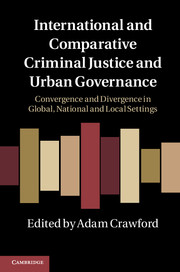 International and Comparative Criminal Justice and Urban Governance
International and Comparative Criminal Justice and Urban Governance Book contents
- Frontmatter
- Contents
- List of figures
- List of tables
- Notes on contributors
- Acknowledgements
- 1 International and comparative criminal justice and urban governance
- PART 1 International criminal justice
- 2 Unintended justice: the United Nations Security Council and international criminal governance
- 3 The International Criminal Court and the state of the American exception
- 4 Universal crimes, universal justice? The legitimacy of the international response to genocide, crimes against humanity and war crimes
- 5 Locating victim communities within global justice and governance
- 6 Dealing with war crimes in Bosnia: retributive and restorative options through the eyes of the population
- 7 Shaping penal policy from above? The role of the Grand Chamber of the European Court of Human Rights
- PART 2 Comparative penal policies
- PART 3 Comparative crime control and urban governance
- Index
- References
2 - Unintended justice: the United Nations Security Council and international criminal governance
from PART 1 - International criminal justice
Published online by Cambridge University Press: 05 June 2011
- Frontmatter
- Contents
- List of figures
- List of tables
- Notes on contributors
- Acknowledgements
- 1 International and comparative criminal justice and urban governance
- PART 1 International criminal justice
- 2 Unintended justice: the United Nations Security Council and international criminal governance
- 3 The International Criminal Court and the state of the American exception
- 4 Universal crimes, universal justice? The legitimacy of the international response to genocide, crimes against humanity and war crimes
- 5 Locating victim communities within global justice and governance
- 6 Dealing with war crimes in Bosnia: retributive and restorative options through the eyes of the population
- 7 Shaping penal policy from above? The role of the Grand Chamber of the European Court of Human Rights
- PART 2 Comparative penal policies
- PART 3 Comparative crime control and urban governance
- Index
- References
Summary
Introduction
In the last two decades, the United Nations (UN) Security Council has – almost accidentally – created the rudiments of a system of international criminal justice. This chapter explores the Security Council's development of these foundations of a system of international criminal justice and its unintended consequences. In both investigation and fact-finding, and in its sanctions practice, the Council's approach has moved in the last twenty years from one based on interstate and diplomatic tools towards arrangements that more closely resemble criminal justice tools found at the national level. And in each case, this has led to calls for similar procedural norms that govern criminal justice at the national level – such as due process and the need for an impartial decision-maker – to govern the use of these tools at the international level.
The relationship between the Security Council and the development of international criminal justice tools is a surprisingly under-studied question. While there have been numerous examinations in recent years of the Security Council's human rights and rule of law obligations (Clapham 2006; Chesterman 2008, 2009; Flynn 2006; Wood 2006), most of these studies are confined to theoretical examinations of the application of international law to the Council, or its subsidiary organs of the Council (see Goldstone and Smith 2008 and Zappalà 2003 on international criminal tribunals; and see Farrall 2007 on sanctions mechanisms).
- Type
- Chapter
- Information
- International and Comparative Criminal Justice and Urban GovernanceConvergence and Divergence in Global, National and Local Settings, pp. 41 - 66Publisher: Cambridge University PressPrint publication year: 2011
References
- 1
- Cited by


